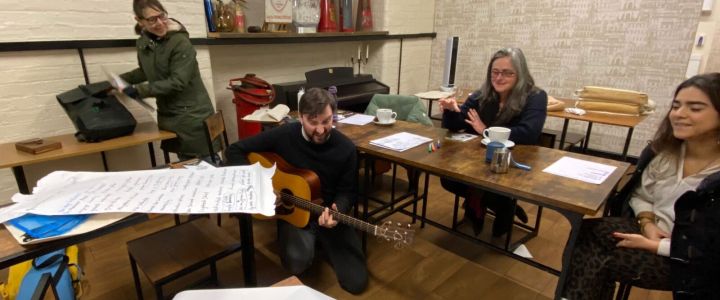Research
Research Interests
With a background in Science and Technology Studies (STS), Angela's research covers two main areas. Firstly, she is interested in critically understanding the adaptation of buildings and cities to a range of different pressures. She unpacks the interactions between socio-economic, governance, ecological and technological processes that shape the built environment. Work here has examined the use of new technologies and processes to adapt urban areas to increased flood risk and heatwaves.
Secondly, her research traverses the boundaries between different academic disciplines, and between academics and non-academics. She critically explore transdisciplinary knowledge practices, with a particular focus on environmental change. She has worked with artists (e.g. musicians) in order to develop novel ways to help people to think about a future under extreme climate change. She also works closely with local government organisations, NGO's and charities to mediate the ‘usability’ gap between academic research and policy-making by applying innovative co-productive methods towards generating evidence and good practice guidance on flood risk management and climate change.
Invited Discussions
Connelly, A., Teaching climate resilience to architects: the need for interdisciplinary working. The Manchester Festival of Climate Action, University of Manchester, 14th October 2021.
Connelly, A., ‘Architecture, Climate and Society’. Society of Architectural Historians of Great Britain, Annual Symposium, 2021. Architectural History + The Climate Emergency., 10 June 2021.
Connelly, A., 'Architecture, Climate and Society', Architects Climate Action Network (ACAN), Educators Workshop, 7 April 2021.
Expert reviewer for journals and publishers
She has peer-reviewed for
• GeoForum, Environment and Planning C, Natural Hazards, Urban Design and Planning (Institution of Civil Engineers), Journal of Urban Design, Sustainability, International Journal of Disaster Resilience in the Built Environment, Culture and Religion.
She has reviewed book proposals for the following publishers:
• Routledge books, Manchester University Press and Bloomsbury
Grants
2021
• Songs of Resilience: bringing new voices into climate research (PI), with University of Manchester and University of Glasgow. Funded by the Arts and Humanities Research Council. Total award: £9988.
2018
• Flood resilience in British Standards (Co-I - consultancy). Led by JBA Consulting, with Building Research Establishment and Manchester Metropolitan University. Funded by the British Standards Institute. Total award: £40, 000 (£5000)
2016
• When Tomorrow Becomes Yesterday: Exploring Climate Change Through Song (Co-I). Led by University of West of Scotland, with University of Edinburgh, Creative Carbon Scotland. Funded by the Arts and Humanities Research Council – Connected Communities Festival, 2016. Total Award: £19, 754.
• Sacred Suburbs: Exploring Post-war Places of Worship in Manchester (PI). Funded by the University of Manchester, Rapid Response Impact Fund. Total Award: £300.
• Mapping Flood Disadvantage in Scotland (Co-I). Led by Cardiff University with Manchester Metropolitan University. Funded by the Scottish Government. Total Award: £38, 000 (£9,240)
2014
• Fields of Green: Addressing Sustainability and Climate Change through Music Festival Communities (Co-I). Led by University of Edinburgh, with University of West of Scotland and Creative Carbon Scotland. Funded by the Arts and Humanities Research Council. Total Award £45, 682.
• Working with Social Haunting: Past and Present-making in Two Communities of Value (Co-I). Led by: Manchester Metropolitan University with Liverpool John Moores University, University of Sheffield, UNITE the Community, The Co-operative College. Funded by the Arts and Humanities Research Council. Total Award £33, 828
• Surveying for Flood Resilience in Individual Properties (Co-I). Led by JBA Consulting, with Manchester Metropolitan University, Touchstone Learning, National Flood Forum. Funded by the Department for Environment, Food and Rural Affairs (Defra). Total Award: £41, 463
• Tracing Impact and Maintaining Relevance: Six Steps to Flood Resilience (Co-I). Funded by the Strategic Investment Research Fund (The University of Manchester). Total award: £9, 740.
2013
• Monitoring and Evaluation of the Defra Community Flood Resilience Scheme (Co-I). Funded by Rochdale Borough Council. Total Award: £20, 000.
• Building Flood Resilient Communities (Co-I). Funded by The University of Manchester, Strategic Investment Research Fund. Total Award: £14, 780.
2012
• Sustainable Student Engagement in Neighbourhood Planning: towards a Manchester model (Co-I). Funded by the Strategic Investment Research Fund (The University of Manchester). Total award: £19, 636.
• Evaluation of the Growing Manchester Programme (Co-I). Funded by Manchester City Council. Total Award: £8, 000.
Exhibitions
Gidman, A., Connelly, A., 2024. Natural Materials Now, Manchester School of Architecture, 2/2/2024 - 16/2/2024.
Book Chapters
Connelly, A., 2022. 'Planning for faith in Wythenshawe, Manchester'. In Sterken, S., Weyns, E. (eds.) Territories of Faith: Religion, Urban Planning and Demographic Change in Post-War Europe, pp. 37-62, Leuven University Press.
Rome, E., Bogen, M., Lückerath, D., Ullrich, O., Worst, R., Streberová, E., Dumonteil, M., Mendizabal, M., Abajo, B., Feliu, E., Bosch, P., Connelly, A., Carter, J., 2019. 'Risk-based analysis of the vulnerability of urban infrastructure to the consequences of climate change'. In Advanced Sciences and Technologies for Security Applications, pp. 55-75.
Connelly, A., 2017. 'GET ME OUT OF HERE! ASSESSING AMBRIDGE'S FLOOD RESILIENCE'. In Custard, Culverts and Cake: Academics on Life in The Archers, pp. 115-130.
O'Hare, P., White, I., Connelly, A., 2016. 'Insurance as maladaptation: Resilience and the `business as usual' paradox'. In The Routledge Handbook of International Resilience, pp. 238-250.
Connelly, A., Steele, M., 2016. 'Surveying Greater Manchester's Sacred Suburbs'. In Modern Futures, Uniformbooks.
Connelly, A., 2015. ''He saw the city and wept': The Manchester and Salford Methodist Mission, 1910-60'. In Culture in Manchester: Institutions and Urban Change since 1850, pp. 123-147.
Connelly, A., Guy, S., 2015. 'Mapping Sustainability Concerns'. In Catalyst: Art, Sustainability and Place in the Work of Wolfgang Weileder, erlag der Buchhandlung Walther Konig.
Connelly, A., 2013. '"And when he saw the city he wept": Methodism's mission to Manchester's working classes.'. In Culture in Manchester Institutions and Urban Change Since 1850, Manchester University Press.
Reports
Kazmierczak, A., Connelly, A., Sherriff, G., 2024. 'Evaluation of the Growing Manchester programme', University of Manchester.
Carter, J., Connelly, A., Vlastaras, V., Barker, A., Rothwell, J., Evans, S., Morrison, R., Skeggs, J., 2024. 'Innovative Financing and Delivery of Natural Climate Solutions in Greater Manchester (Ignition): Baseline Report D 2.4.2'.
Jones, B., O'Hare, P., Connelly, A., Barker, M., 2024. 'Research into Standards for Flood Resilience', British Standards Institution.
Connelly, A., 2024. 'Review of Water Governance in Greater Manchester: A report for the Natural Course project.', Colloaboratory for urban resilience and energy, Manchester Urban Institute.
Kamierczak, A., Cavan, G., Lindley, S., Connelly, A., 2015. 'Mapping Flood Disadvantage in Scotland', The Scottish Government.
Connelly, A., Garvin, S., Lawson, N., O'Hare, P., White, I., 2013. 'Six Steps to Flood Resilience', School of Environment and Development, University of Manchester.
Connelly, A., Hebbert, M., 2011. 'Liverpool's Early Railway Heritage', Manchester Architecture Research Centre, University of Manchester.
Journal Articles
Hincks, S., Carter, J., Connelly, A., 2023. 'A New Typology of Climate Change Risk for European Cities and Regions: Principles and Applications', Global Environmental Change, 83, pp. 102767-102767.
Connelly, A., Snow, A., Carter, J., Wendler, J., Lauwerijssen, R., Glentworth, J., Barker, A., Handley, J., Haughton, G., Rothwell, J., 2023. 'What approaches exist to evaluate the effectiveness of UK-relevant natural flood management measures? A systematic map', Environmental Evidence, 12, pp. 12-12.
Connelly, A., O'Hare, P., White, I., 2020. '"The best flood I ever had": Contingent resilience and the (relative) success of adaptive technologies', Cities, 106, pp. 102842-102842.
Connelly, A., Snow, A., Carter, J., Lauwerijssen, R., 2020. 'What approaches exist to evaluate the effectiveness of UK-relevant natural flood management measures? A systematic map protocol', Environmental Evidence, 9 (11), pp. 1-13.
Brennan, M., Scott, J.C., Connelly, A., Lawrence, G., 2019. 'Do music festival communities address environmental sustainability and how? A Scottish case study', Popular Music, 38 (2), pp. 252-275.
Connelly, A., Hanania, S., Kiernicka-Allavena, J., 2019. 'Water, heritage and sustainability in practice: the cases of Rochdale and Wroclaw', European Journal of Creative Practices in Cities and Landscapes, 2 (1).
Connelly, A., Carter, J., Handley, J., Hincks, S., 2018. 'Enhancing the practical utility of risk assessments in climate change adaptation', Sustainability (Switzerland), 10 (5), 12.
Connelly, A., 2017. 'Urban Redevelopment and Modernity in Liverpool and Manchester, 1918-1939', ARCHITECTURAL HISTORY, 60, pp. 361-362.
Connelly, A., Guy, S.C., Wainwright, E., Weileder, W., Wilde, M., 2016. 'Catalyst: Reimagining sustainability with and through fine art', Ecology and Society, 21 (4), 7.
White, I., Connelly, A., Garvin, S., Lawson, N., O'Hare, P., 2016. 'Flood resilience technology in Europe: identifying barriers and co-producing best practice', Journal of Flood Risk Management, 11 (S1), pp. S468-S478.
Carter, J.G., Cavan, G., Connelly, A., Guy, S., Handley, J., Kazmierczak, A., 2015. 'Climate change and the city: Building capacity for urban adaptation', Progress in Planning, 95.
Connelly, A., 2015. 'Continuity and adaptation: Archway central hall, 1934-2010', London Journal, 40 (1), pp. 33-55.
O'Hare, P., White, I., Connelly, A., 2015. 'Insurance as maladaptation: Resilience and the 'business as usual' paradox', Environment and Planning C: Government and Policy, 34 (6), pp. 1175-1193.
Connelly, A., Gabalda, V., Garvin, S., Hunter, K., Kelly, D., Lawson, N., O'Hare, P., White, I., 2015. 'Testing innovative technologies to manage flood risk', Proceedings of the Institution of Civil Engineers: Water Management, 168 (2), pp. 66-73.
Connelly, A., 2014. 'Building the Modern Church: Roman Catholic Church Architecture in Britain, 1955 to 1975', ARQ-ARCHITECTURAL RESEARCH QUARTERLY, 18 (2), pp. 177-178.
Connelly, A., 2014. 'Garden suburbs of tomorrow? A new future for the cottage estates', PLANNING PERSPECTIVES, 29 (3), pp. 407-408.
Connelly, A., 2013. 'The feminine public sphere: middle-class women and civic life in Scotland, c. 18701914', GENDER PLACE AND CULTURE, 20 (1), pp. 134-136.
Connelly, A., 2013. 'The working-class suburb: social change on an English Council Estate, 1930-2010', PLANNING PERSPECTIVES, 28 (4), pp. 651-653.
Connelly, A., 2012. 'A pool of Bethesda: Manchester's First Wesleyan Methodist Central Hall', Bulletin of the John Rylands University Library of Manchester, 89 (1), pp. 105-125.
Tippett, J., Connelly, A., How, F., 2011. 'You Want Me to Do What? Teach a Studio Class to Seventy Students?', The Journal for Education in the Built Environment, 6 (2), pp. 26-53.
Non-Peer Reviewed Articles
O'Hare, P., White, I., Connelly, A., 2017. 'Insuring we fail? Flood risk, vulnerability and the limits to 'bouncing back'.', Town and country planning : the quarterly review of the Town and Country Planning Association, pp. 160-165.
White, I., Connelly, A., Garvin, S., Lawson, N., O'Hare, P., 2015. 'Towards best practice in property level protection', Town and Country Planning, pp. 82-87.
Conference Papers
Cavan, G., Kazmierczak, A., Connelly, A., Lindley, S., 2017. 'Multi-dimensional social vulnerability and flood disadvantage assessment to support socially just flood risk management', 21st International Congress on Biometeorology, Durham, UK, 3/9/2017 - 7/9/2017.



